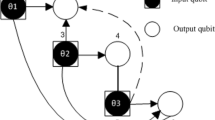Abstract
Among the models of quantum computation, the One-way Quantum Computer [11,12] is one of the most promising proposals of physical realisation [13], and opens new perspectives for parallelisation by taking advantage of quantum entanglement [2]. Since a One-way QC is based on quantum measurement, which is a fundamentally nondeterministic evolution, a sufficient condition of global determinism has been introduced in [4] as the existence of a causal flow in a graph that underlies the computation. A O(n 3)-algorithm has been introduced [6] for finding such a causal flow when the numbers of output and input vertices in the graph are equal, otherwise no polynomial time algorithm was known for deciding whether a graph has a causal flow or not. Our main contribution is to introduce a O(m)-algorithm for finding a causal flow (where m is the number of edges of the graph), if any, whatever the numbers of input and output vertices are. This answers the open question stated by Danos and Kashefi [4] and by de Beaudrap [6]. Moreover, we prove that our algorithm produces a flow of minimal depth.
Whereas the existence of a causal flow is a sufficient condition for determinism, it is not a necessary condition. A weaker version of the causal flow, called gflow (generalised flow) has been introduced in [3] and has been proved to be a necessary and sufficient condition for a family of deterministic computations. Moreover the depth of the quantum computation is upper bounded by the depth of the gflow. However the existence of a polynomial time algorithm that finds a gflow has been stated as an open question in [3]. In this paper we answer this positively with a polynomial time algorithm that outputs an optimal gflow of a given graph and thus finds an optimal correction strategy to the nondeterministic evolution due to measurements.
Access this chapter
Tax calculation will be finalised at checkout
Purchases are for personal use only
Preview
Unable to display preview. Download preview PDF.
Similar content being viewed by others
References
Bard, G.V.: Achieving a log(n) Speed Up for Boolean Matrix Operations and Calculating the Complexity of the Dense Linear Algebra step of Algebraic Stream Cipher Attacks and of Integer Factorization Methods. Cryptology ePrint Archive, Report 2006/163 (2006)
Broadbent, A., Kashefi, E.: Parallelizing Quantum Circuits. arXiv, quant-ph 0704.1806 (2007)
Browne, D., Kashefi, E., Mhalla, M., Perdrix, S.: Generalized flow and determinism in measurement-based quantum computation. NJP 9, 250 (2007)
Danos, V., Kashefi, E.: Determinism in the one-way model PRA, 74 (2006)
Danos, V., Kashefi, E., Panangaden, P.: The measurement calculus. J. ACM 54(2) (2007)
de Beaudrap, N.: Finding flows in the one-way measurement model. Phys. Rev. A 77, 022328 (2008)
de Beaudrap, N.: Complete algorithm to find flows in the one-way measurement model (2006) arXiv, quant-ph 0603072
Hein, M., Dür, W., Eisert, J., Raussendorf, R., Van den Nest, M., Briegel, H.J.: Entanglement in graph states and its applications. In: Proc. of the Int. School of Physics Enrico Fermi on Quantum Computers, Algorithms and Chaos (July 2005) quant-ph/0602096
Høyer, P., Mhalla, M., Perdrix, S.: Resources required for preparing graph states. In: Asano, T. (ed.) ISAAC 2006. LNCS, vol. 4288. Springer, Heidelberg (2006)
Pei, M., de Beaudrap, N.: An extremal result for geometries in the one-way measurement model. Quantum Information and Computation 8(5) (2008)
Raussendorf, R., Briegel, H.: A one-way quantum computer. PRL 86 (2001)
Raussendorf, R., Briegel, H.: Computational model underlying the one-way quantum computer. Quantum Information and Computation 2(6) (2002)
Walther, P., Resch, K., Rudolph, T., Schenck, E., Weinfurter, H., Vedral, V., Aspelmeyer, M., Zeilinger, A.: Experimental one-way quantum computing. Nature 434 (2005) (quant-ph/0503126)
Author information
Authors and Affiliations
Editor information
Editors and Affiliations
Rights and permissions
Copyright information
© 2008 Springer-Verlag Berlin Heidelberg
About this paper
Cite this paper
Mhalla, M., Perdrix, S. (2008). Finding Optimal Flows Efficiently. In: Aceto, L., Damgård, I., Goldberg, L.A., Halldórsson, M.M., Ingólfsdóttir, A., Walukiewicz, I. (eds) Automata, Languages and Programming. ICALP 2008. Lecture Notes in Computer Science, vol 5125. Springer, Berlin, Heidelberg. https://doi.org/10.1007/978-3-540-70575-8_70
Download citation
DOI: https://doi.org/10.1007/978-3-540-70575-8_70
Publisher Name: Springer, Berlin, Heidelberg
Print ISBN: 978-3-540-70574-1
Online ISBN: 978-3-540-70575-8
eBook Packages: Computer ScienceComputer Science (R0)




